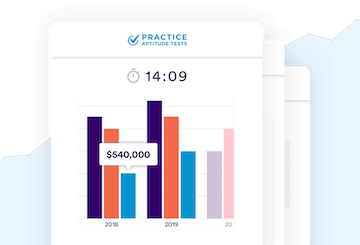How are psychometric tests scored?
Different test providers and employers choose to convey results in different ways. Scores listed may include the raw score (number of correct responses given), attempted score, percentage accuracy or precision score (conveyed using three values: number of questions attempted, work rate and hit rate).
Comparison scores – used so your result can be placed relative to the mean score of your test cohort – may also be given. A percentile score is often used to compare and filter candidates.
What are psychometric tests used for?
Psychometric tests are used by employers to assess a candidate’s personal traits, as well as their knowledge and skills. This allows employers to build a personal profile and see if it matches with the company’s culture and the role in particular.
They also provide an overview of how the person might perform in the workplace. This all helps employers streamline the hiring process by finding the right candidates more quickly.
Will I get feedback on my test results?
Test feedback can be useful in showing your strengths and weaknesses, helping you to improve your performance the next time you encounter such tests.
While not all organisations provide automatic feedback due to candidate volume, it’s always worth asking if further insight into your score is available.
The most useful type of feedback is test-dependent. For example, for situational judgement assessments, enquire about the alignment of your answers with the desired company behaviours/ethos. This is vital if you intend to reapply to the same company in the future.
What do psychometric tests measure?
Psychometric tests measure both cognitive ability and mental agility. Different tests evaluate specific skills, such as comprehension, arithmetic ability or a candidate’s approach and attitude. They commonly focus less upon knowledge and more on problem-solving ability and accuracy under pressure.
The tests are designed to reveal if prospective candidates have the traits sought for the job role in question. They allow employers to judge how a candidate will handle routine tasks, interact with co-workers and cope in stressful situations. The measurements provided by psychometric tests are considered to give a strong indication of a candidate’s potential to excel.
Where can I practice psychometric tests?
You can practice sitting psychometric tests either using test practice books or online practice tests (the latter is recommended).
Familiarising yourself with the test format and content will help to dispel nerves about what to expect on the day, and give you a greater chance of achieving a high score.
Practice Aptitude Tests has a comprehensive catalogue of psychometric tests written by accredited professionals. To help you improve, we offer worked solutions for each test and an interactive dashboard to track your progress. Start your preparation today by trying out our free tests.
What can I do if I fail my test?
Unfortunately, if you fail your test, you will not normally be able to resit. It should not, however, prevent you from applying to the same company in the future.
The best thing to do after receiving a disappointing result is to learn from the experience and improve. Try to obtain feedback on your performance and practice more of the tests, considering what you were able to glean from your unsuccessful attempt.
Why are psychometric tests so hard?
Many candidates find psychometric tests difficult, especially at the first attempt. The tests are hard so that employers can be confident they will filter candidates and retain the best applicants, including those best able to perform under pressure.
Psychometric tests may be hard, but preparation will help you feel calm, confident and be less easily caught off-guard during your assessment.
Which employers use psychometric tests?
The reality is: most of them, especially among larger companies. Psychometric tests provide employers with detailed information and an understanding of a potential worker’s profile.
You should therefore expect these tests to be a part of the hiring process, whether you’re applying for a blue-chip enterprise or a smaller company. You can see a full list of employers that use psychometric testing here.






